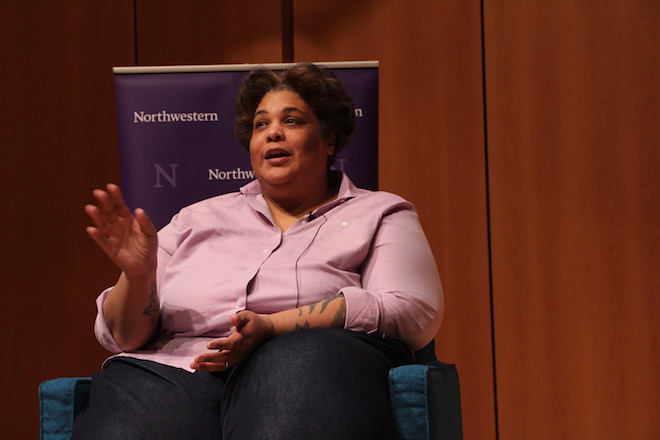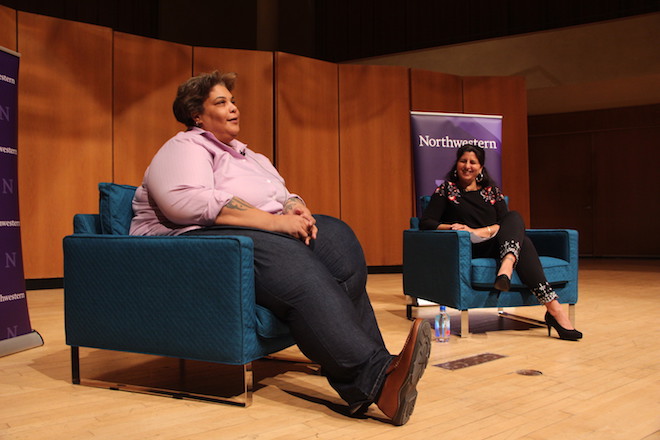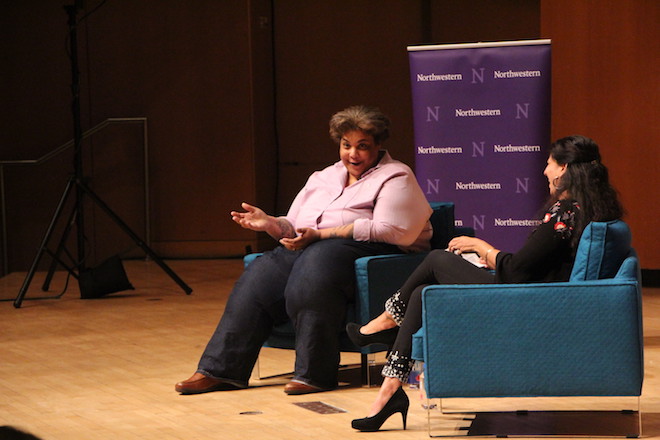Acclaimed author and cultural critic Roxane Gay shares stories at a CTSS and Women's Center event.
Photo by Claire Bugos / North by Northwestern
Pick-Staiger Concert Hall seats 1,003 people. It brimmed to capacity on Tuesday night, when – after a thunderous round of applause – writer and cultural critic Roxane Gay quipped, “I guess people showed up.”
Gay spoke with moderator Nitasha Sharma, an associate professor of African American studies, in an conversation co-sponsored by the Contemporary Thought Speaker Series and the Women’s Center. The room was “very diverse,” for Gay – at least, she joked, as a woman who teaches in Indiana.
A jack of all trades, the writer is a master of all: an associate professor of English at Purdue University, she’s also a regular opinion writer for The New York Times and publishes acclaimed work – fiction and nonfiction alike – fusing every topic from womanhood and trauma to the body and social justice.
She shared the turning point of her writing career in response to a question by Bienen and Weinberg junior Kandise Le Blanc, who studies creative writing. It came after an editor tried (and failed) to shift her story’s setting from the suburbs to the ghetto.
“People don’t believe that Black people live in the suburbs,” he had told Gay. “You don’t know shit about shit,” she responded matter-of-factly, “and are trying to tell me that my Black experience is not valid because it doesn’t fit in your pre-formed narrative.”
“From that moment, I knew that I was never going to allow someone to put me in a box in terms of what I write about,” Gay said. “I try to always do something different with each project. But is there connective tissue? Absolutely.”
While that tissue connects her overarching body of work, Gay aims to write about her areas of interest in ways that “don’t feel like medicine.” Her work artfully balances empathy and hard conversations, but stays engaging and human. She’s not a robot, she says, and her eyes light up at the mention of HGTV.
“I think that people treat pop culture – and the rest of culture – as a binary, as if it’s either-or,” Gay said. “But it’s actually a spectrum, and the kinds of things that we see in popular culture have generally trickled down from the broader culture at large.”
Her New York Times tagline reads that she covers the “intersection of identity and culture,” where she keeps things both hard hitting and engaging: Her most recent piece deep dives into the Roseanne reboot.
It needs to be taken seriously, she told Sharma, because popular culture and the country’s political atmosphere are two threads of the same conversation. Take Black Panther, for example, and the media requests in her inbox that she declined because they asked the same tired question: “Would your life have changed if you had Black Panther growing up?”
“Like, what the fuck?”
“I think Black people do have heroes: We have heroes in our families, in our communities, and in the culture at large, but we rarely get to see superheroes – like Marvel superheroes – and see ourselves represented in that realm,” Gay said. “That’s the difference; it’s not that we lack heroes.”
The conversation covered everything from her 453,000 Twitter followers (sometimes she forgets she isn’t discussing yogurt with 200 of her friends) to audience questions about growing up Black in Nebraska and staying authentic. One common theme surfaced time and time again: the modern Renaissance that Gay sees in Black art.
Moonlight, Atlanta, Lena Waithe and Issa Rae are incredible, of course, but she hopes that we lower the bar. Black artists will have made it when their bar for entry isn’t just limited to “Emmy award-winning, Oscar-winning, Golden Globe-winning."
“Aim low, I say,” she laughed – as did the audience. “Aim low!”
Punchy one-liners peppered the dialogue, flowing naturally and softening deeper conversations about race, gender, thinking versus being. Sharma highlighted Gay’s humanity.
“I really appreciate, Roxane, your overarching connection and call and exhibition of expansive empathy across difference,” she said. “I’m really moved by your question ... ‘How helpless are we willing to be, what sacrifices are we willing to make for the greater good?’”
The audience seemed to share the sentiment: Le Blanc, the student and aspiring writer, found guidance in collaging multiple aspects of her identity.
“I was really inspired by just the way that she expressed a sense of empathy, but also activism,” she said. “Because I think – in our culture right now – oftentimes those two are juxtaposed as contrary forces, but I think she unified it as a necessary unison between the two.”



